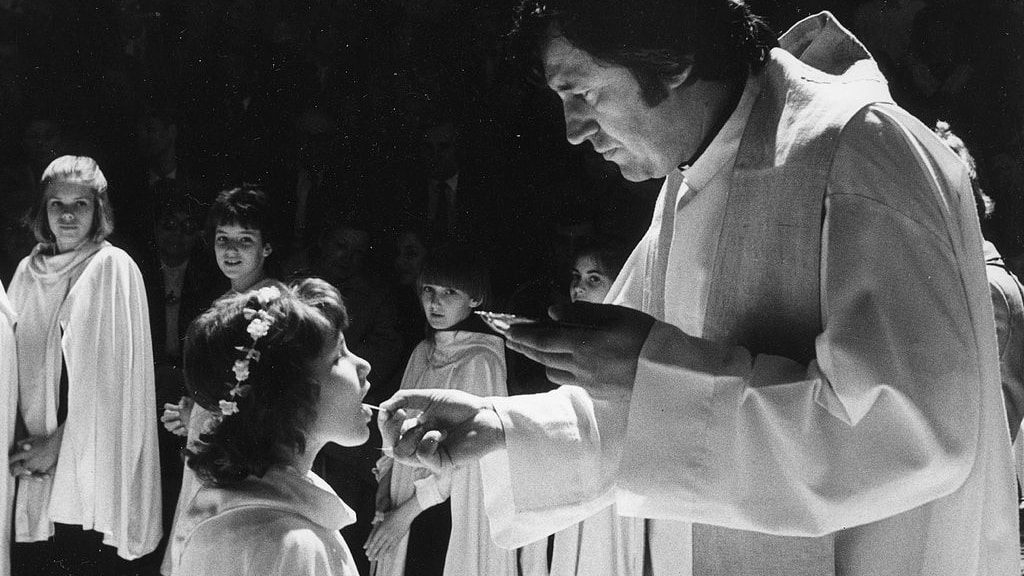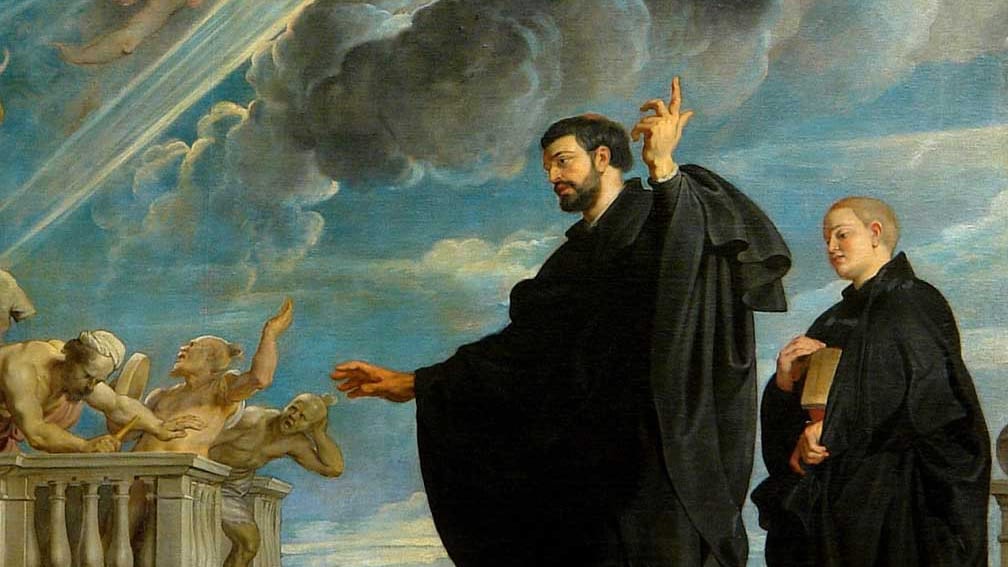At first glance it almost seems Jesus was being a bit harsh or unsympathetic to the man who said to Him, “Let me go first and bury my father.” What the Gospel doesn’t tell us, however, is that the man’s father probably wasn’t anywhere close to dying, but in good health; his son was just using his possible death as an excuse. It would be the same as if someone today in southeast Michigan were to say, “Lord, I want and intend to follow You, but there’s a little problem. You see, I’ve been a big baseball fan all my life, and I firmly believe in remaining loyal to my team and especially cheering them on when they’re successful—so just as soon as the Tigers win a World Series, I’m all Yours.” We might imagine someone trying to say that with a straight face, while desperately hoping Jesus knew nothing about baseball and the lousy state of Detroit’s major league team.
It seems to be part of our human nature to keep our options open and avoid making commitments; this is especially true in today’s world, but it even happened in ancient times. There are inscriptions carved in stone at the Roman catacombs where the early Christians buried their dead; one of them reads, “Audienti protractae,” which means “to the listener who overdid her time.” Evidently there was a catechumen, a young woman, who carefully listened to the instructions necessary for baptism. Apparently, however, she was never baptized; she kept delaying that commitment, and then died unexpectedly. The woman obviously didn’t abandon the Church—otherwise she wouldn’t have been buried where she was. She didn’t die as a martyr, for that would have been indicated. The customary blessing of peace, “Requiescat in pace,” wasn’t carved at her burial niche, as it was for Christians. The early Church obviously hoped the woman was saved, but had no assurance this was the case; in her procrastination and indecision, she may have waited too long to commit herself to Christ (Carlos G. Valles, The Art of Choosing, pp. 65-66). When Jesus invites us to follow Him, this invitation is an honor, a challenge, and a promise of great blessing and reward. However, it comes with a strict but unknown deadline—and failing to meet it is the ultimate failure, and an everlasting tragedy.
God always respects our free will, and if we answer His call, He desires our response to Him to be wholehearted. This dynamic was at work in 1 Kings (19:16, 19-21) when Elisha took the radical step of slaughtering his priceless oxen and burning his irreplaceable plowing equipment in order to begin his mission of succeeding the great prophet Elijah. The same idea is also emphasized in the Gospel of Luke (9:51-62) when Jesus called several prospective disciples to follow Him without worrying about worldly concerns. Our Lord also refused to destroy with heavenly fire a Samaritan village that wouldn’t welcome Him; by their rejection of the Savior, those Samaritans were passing judgment on themselves. As St. Paul reminds us in his Letter to the Galatians (5:1, 13-18), we must not misuse our God-given freedom for primarily worldly purposes; our free choices make sense only if they help bring us closer to the Lord.
In the land of Holland many centuries ago, lazy people who refused to work were subjected to an unusual punishment: they were locked in a small cell, into which a stream of water constantly flowed. To avoid drowning, the prisoner had to pump the water out, using a handle in the wall. The amount of water was adjusted to the person’s size and strength, and each day it increased in volume. Unused muscles became sore but strong, weak bodies and minds became motivated to work hard, and slothful persons received a first-hand lesson on the value and importance of pulling their weight. After a few days of this punishment, prisoners invariably promised to change their ways, and were released (Rev. Francis Spirago, Anecdotes And Examples for the Catechism, p. 76).
Spiritual laziness is a major reason why many people—especially in American society today—don’t want to make a true commitment to Christ or fulfill their religious duties.
All across the country, Mass attendance is down, fewer children are in religious education programs, Catholics—especially young adults—are less likely to contribute to the Church than previous generations, many parishes find it harder to recruit volunteers, and—perhaps worst of all—quite a few persons called to the priesthood or religious life are apparently not hearing or answering this invitation. Even those of us here at Mass each weekend—as commendable as that is—probably could be doing an even better job of putting Jesus at the center of our lives. If we’re honest, we’ll admit that sometimes it can be so tempting to take the easy way out when it comes to living our faith, or to rearrange our religious priorities according to our personal preferences and convenience.
When that happens, the Lord may begin pumping a little bit more stress into our lives, forcing us to work harder in a spiritual sense so as to keep our heads above water. Maybe an experience of failure, or a concern about our health, or a financial problem, is intended to remind us that we must place our trust in God alone. Perhaps a strained relationship, or a major setback or disappointment, or an experience of loss, is meant to help us center our lives around Christ more deeply. It’s possible a period of spiritual dryness, in which prayer and religious practices bring us no joy or peace, is God’s way of prompting us to surrender our lives more fully into His hands. The Lord always respects our free will, but if He sees us becoming spiritually stale or lazy, or even worse, starting to head in the wrong direction—the wide and easy path that leads to eternal damnation—He will shake us up, giving us the chance to repent and to become once again spiritually on fire and alive.
Sometimes people don’t want to commit, or accept an invitation, out of sheer laziness, but other times they may simply be waiting for a better offer. However, no one can or ever will offer us something better or greater than the eternal life and happiness Jesus promises to those who willingly serve and follow Him. As the Gospel reminds us, however, His call is not something we can take for granted or treat casually or postpone to a more convenient time—for we do not know when we’ll reach our personal deadline and have the invitation expire. It can be prudent to analyze our situation and carefully consider our options, but the time must come when we make a firm commitment—and only those who choose to live as genuine followers of Jesus have the assurance that they’ve made a choice they will never regret.








